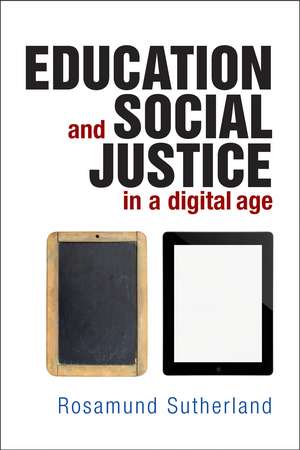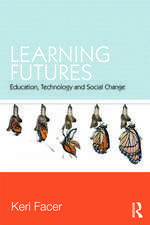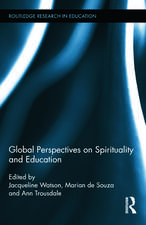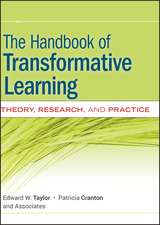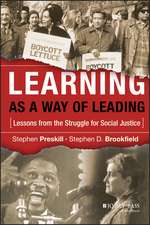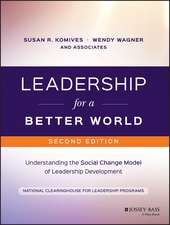Education and Social Justice in a Digital Age
Autor Rosamund Sutherlanden Limba Engleză Paperback – 26 noi 2013
In many countries, the focus of school curriculum shifts back and forth between traditional subjects (such as mathematics and history) and the development of skills (such as problem solving). Rosamund Sutherland argues here that skills-focused curriculum—often seen as preparing students to work in our digital age—can actually exacerbate existing social inequalities. Arguing from a social justice perspective, she contends that schools should prioritize instruction in traditional subjects, which can provide disadvantaged students with formal knowledge they are not likely to learn outside school. Sutherland’s theoretical and practical insights point toward changes in policy and practice that could help improve student’s lives.
| Toate formatele și edițiile | Preț | Express |
|---|---|---|
| Paperback (1) | 319.20 lei 22-36 zile | |
| Bristol University Press – 26 noi 2013 | 319.20 lei 22-36 zile | |
| Hardback (1) | 772.77 lei 43-57 zile | |
| Bristol University Press – 26 noi 2013 | 772.77 lei 43-57 zile |
Preț: 319.20 lei
Nou
Puncte Express: 479
Preț estimativ în valută:
61.08€ • 63.94$ • 50.54£
61.08€ • 63.94$ • 50.54£
Carte disponibilă
Livrare economică 17-31 martie
Preluare comenzi: 021 569.72.76
Specificații
ISBN-13: 9781447305248
ISBN-10: 1447305248
Pagini: 176
Dimensiuni: 152 x 229 x 13 mm
Greutate: 0.27 kg
Editura: Bristol University Press
Colecția Policy Press
ISBN-10: 1447305248
Pagini: 176
Dimensiuni: 152 x 229 x 13 mm
Greutate: 0.27 kg
Editura: Bristol University Press
Colecția Policy Press
Notă biografică
Rosamund Sutherland is the former head of the Graduate School of Education at the University of Bristol.
Cuprins
About the author
Acknowledgements
Preface
1. An unfolding story
Introduction
A personal history
A developing divide
A digital revolution?
This book
2. Expanding the possible: people and technologies
Introducing the digital
People and designed objects
A brief history of digital technologies and education
Institutional factors that influence how digital technologies are used in schools
Transforming learning: expanding the possible
Capabilities, education and social justice
Concluding remarks
3. Knowledge worlds: boundaries and barriers
Introduction
Knowledge and skills in the 21st century
Competing ideologies in the curriculum
Powerful knowledge: an example from mathematics education
Curriculum and social justice
Concluding remarks
4. Ways of knowing: everyday and academic knowledge
School and home
Learning computer programming at home: the case of Alistair
Science simulations and out-of-school game-playing
Everyday and academic concepts
Vygotsky and sociocultural history
Concluding remarks
5. Schools as spaces for creating knowledge
A brief history
Schools as institutions
Personalisation and education
Three scenarios for future schools
Concluding remarks
6. Assessment and the curriculum in a digital age
Introduction
Accountability and challenging low expectations
High-stakes assessment and what is valued in the curriculum
Teaching, feedback and evidence
Rethinking the digital in assessment
Concluding remarks
7. Education in the 21st Century
The purpose of education
Theory as a way of seeing
Knowledge and pedagogy
Knowledge in a digital age
Agency and responsibility
Teachers and teaching
Teachers as professionals
8. The idea of justice in education
Introduction
Capabilities and the ‘opportunities to become’
Cooperation between schools and between students
Cooperation, professional development and leadership
Schooling and social justice
Endnote: on the pleasure of making and writing
References
Index
Acknowledgements
Preface
1. An unfolding story
Introduction
A personal history
A developing divide
A digital revolution?
This book
2. Expanding the possible: people and technologies
Introducing the digital
People and designed objects
A brief history of digital technologies and education
Institutional factors that influence how digital technologies are used in schools
Transforming learning: expanding the possible
Capabilities, education and social justice
Concluding remarks
3. Knowledge worlds: boundaries and barriers
Introduction
Knowledge and skills in the 21st century
Competing ideologies in the curriculum
Powerful knowledge: an example from mathematics education
Curriculum and social justice
Concluding remarks
4. Ways of knowing: everyday and academic knowledge
School and home
Learning computer programming at home: the case of Alistair
Science simulations and out-of-school game-playing
Everyday and academic concepts
Vygotsky and sociocultural history
Concluding remarks
5. Schools as spaces for creating knowledge
A brief history
Schools as institutions
Personalisation and education
Three scenarios for future schools
Concluding remarks
6. Assessment and the curriculum in a digital age
Introduction
Accountability and challenging low expectations
High-stakes assessment and what is valued in the curriculum
Teaching, feedback and evidence
Rethinking the digital in assessment
Concluding remarks
7. Education in the 21st Century
The purpose of education
Theory as a way of seeing
Knowledge and pedagogy
Knowledge in a digital age
Agency and responsibility
Teachers and teaching
Teachers as professionals
8. The idea of justice in education
Introduction
Capabilities and the ‘opportunities to become’
Cooperation between schools and between students
Cooperation, professional development and leadership
Schooling and social justice
Endnote: on the pleasure of making and writing
References
Index
Recenzii
"This is the most refreshing book about education I have read for many years. Any teacher or future teacher, indeed anyone involved in or interested in education, will learn much from reading it. It deftly illustrates that the only way to a more just system is when knowledge is placed at the heart of all we do as teachers."
“Throughout this short, highly readable, and highly enjoyable book . . . there is perhaps surprisingly relatively little space devoted to digital technologies themselves. Sutherland, drawing upon her extensive research experience, focuses her work here very sharply upon her more personal experience. . . . In essence then, this is a book with an ‘it’s the curriculum stupid’ message that is far removed from the evangelical approach to the ‘transformative’ power of digital technologies in education that I feared it might have been. Digital technologies will not, Sutherland argues, make schools irrelevant, or even, in their current form, anachronistic. . . . It is, frankly, a long-time since I enjoyed reading an academic book as much as this one. . . . A clear and powerful introduction to an important set of ideas. The warmth, passion and humanity in the writing are evident.”
